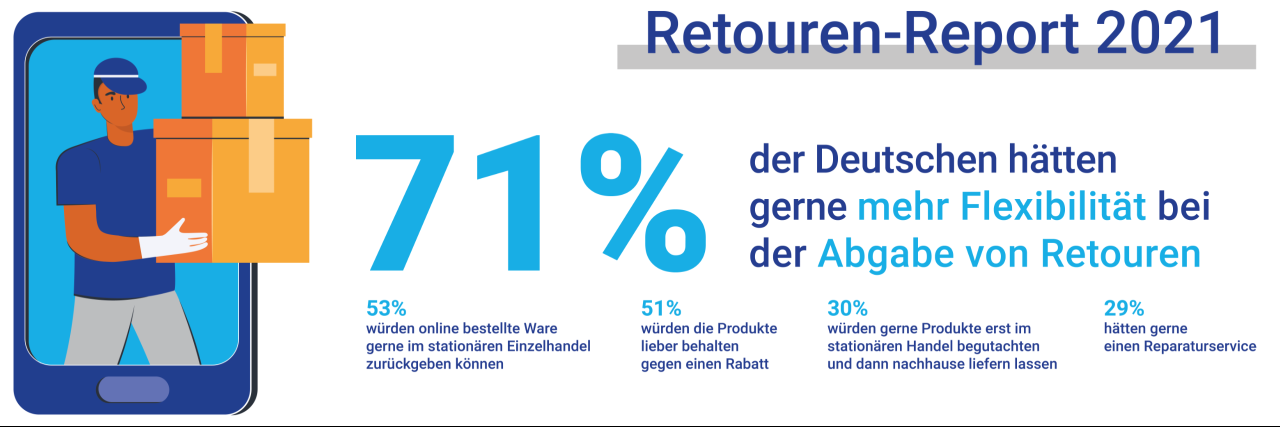Deutsche wünschen sich mehr Nachhaltigkeit vom Online-Handel

In the survey, 69% of respondents stated they have adapted or plan to adapt their online purchasing behavior towards sustainability. However, nearly all Germans (97%) have increasingly ordered via the Internet in the past one and a half years – despite every second person (57%) thinking that brick-and-mortar retail is more sustainable than online retail.
Packaging waste and returns create a poor image of online retail
The topic of "packaging waste" is causing nationwide discussions. The consensus: the more packaging waste, the less sustainable. For the same reason, nearly two-thirds of Germans (62%) see physical retail as having an advantage over online retail. The latter, according to common opinions, has not yet fully exploited its potential to reduce packaging waste. Seven out of ten respondents stated that online retail could promote its sustainability better in their view.
One reason for the larger amounts of packaging waste seen by Germans is the number of returns compared to physical retail. The biggest plus point for retail is that goods can be tried and checked before purchase (64%). Additionally, a large portion of respondents indicated that both product descriptions (50%) and customer communication (43%) in online retail could be improved.
Great potential in return management
This reveals significant potential for online retail. Almost three-quarters of Germans (72%) have returned a package online in the last 12 months. The most common reasons were that the product did not fit or match the description. These reasons exactly address the issue: more information or better communication between retailer and customer could have possibly avoided returns at least in some cases. Exemplifying this, only about two out of ten Germans place no particular value on receiving a warning about duplicates in the shopping cart, whereas 79% do. Moreover, only eleven percent stated that they purchased products in multiple versions to have a greater choice.
Digital return management is on the rise: 61% of respondents stated they had processed at least one return through an online portal in the last twelve months – only the insert return was used more frequently (63%). The highest return rate was among the 25 to 34 age group (79%) – after that, the older, the fewer returns.
Customers want more flexibility in return management
The biggest problem with the insert return, particularly popular among retailers, is poor customer communication. It only offers the possibility to return the product. Through digital return management, however, this communication is sustainably improved. For example, consumers could be offered a discount for a product that does not entirely meet their wishes or a repair service. Half of the Germans (51%) would consider keeping the product in the interest of sustainability rather than returning it for an appropriate discount, 29% would use an offered repair service.
Furthermore, customers would welcome hybrid solutions for purchase and return: 53% would like the option to return goods ordered online in physical stores. In addition, nearly a third (30%) would like to use the "Flagship Store" concept, where products are tried and tested in retail stores and then delivered to their homes.
In the interest of sustainability, nearly half of German online shoppers would be willing to at least partially contribute to return costs (46%). The age group of 55-64 is most likely to accept a cost participation (49%), followed by 48% among 18-24-year-olds. However, this contrasts with the over-65 age group, 72% of whom see the cost obligation entirely with the online retailer.
Germans are generally willing to make their shopping behavior more sustainable. In this context, the majority also wishes, in particular from online retail, to pay more attention to sustainability. Most Germans see significant potential for improvement in return management, which could be positively influenced mainly by better customer communication and more detailed information in the shop. However, since the most commonly used alternative to return communication is still the insert, there is still room for improvement in transparent communication between retailer and customer. If online retail can implement the wishes of customers in the long term, it will positively influence the Customer Experience but also have positive effects on the retailers – and thus contribute significantly to a more sustainable lifestyle.
Survey: The figures were collected by the international survey institute OnePoll for Trusted Returns and include 1,000 participants from Germany.